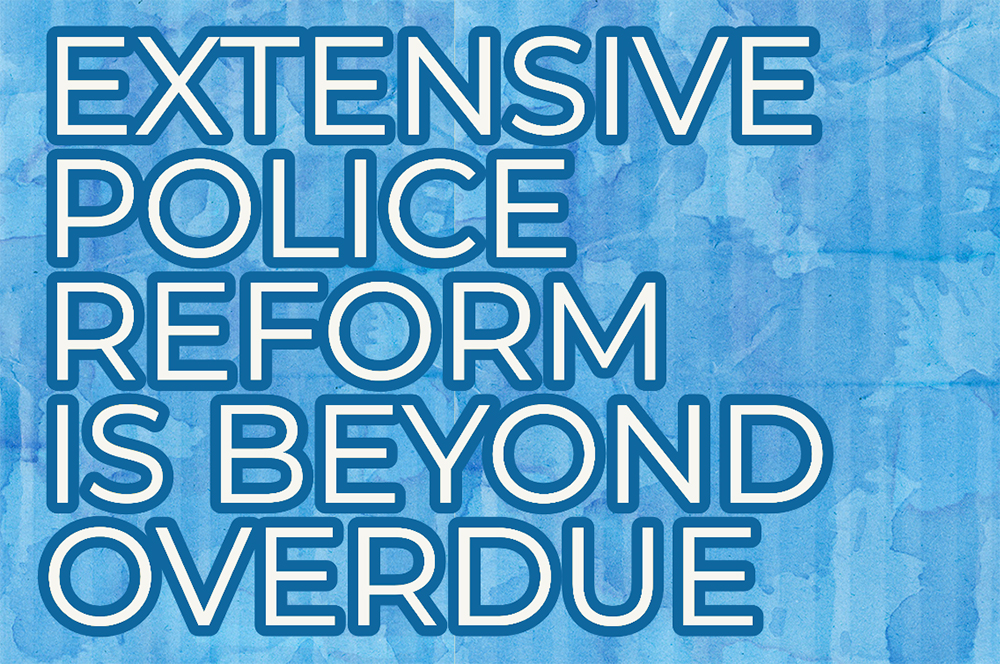In America’s devastating and ongoing story of systemic police brutality, a new chapter has been written in Memphis, Tennessee. On Jan. 7, 2023, five officers from the Memphis Police Department’s elite SCORPION unit pulled over Tyre Nichols, a 29-year-old Black man, for a routine traffic stop. What followed was both horrific and tragically familiar.
The officers viciously beat, pepper sprayed, tasered and ultimately dehumanized Nichols. Following the release of body cam and surveillance footage, it is blatantly clear that Nichols had no weapons nor did he physically fight back in any way. Three days later, he died in the hospital from his wounds. All five officers have been released from duty and arrested for their crimes.
The officers were underprepared, unnecessarily brutal and unable to give Nichols clear and contradiction-free instructions. This indicates a lack of training, poor communication and systematic decay. What happened to Nichols should have never happened, yet it did; it has happened countless times before and will happen again. Something of substance must be done about it.
While the response to George Floyd’s murder in 2020 sparked a demand for change, only minor improvements came to fruition. Meaningful police reform has been put on the back burner following multiple rounds of failed negotiations in Congress, unfulfilled promises and stubborn stances from Republican lawmakers. How many more people will die before this is remedied?
Enough is enough, and the American people agree. According to a Gallup poll, 58% of all Americans and 88% of Black Americans believe substantial changes are needed. Congress needs to pass an extensive police reform bill in order to save lives and restore the public’s faith in the criminal justice system. This will take the collective efforts of both political parties, a special focus on affected communities and concerted lobbying efforts from citizens and organizations.
Despite the understandably emotional calls for defunding the police, the solution is quite the opposite. According to the BBC, about 1,000 people a year are killed by police officers in the U.S. with a disproportionate number of them being Black. 10% of those killed were unarmed.
These issues are systemic, meaning they will not go away independently. They are deeply embedded into our nation’s culture, practices and security measures.
The solution is to change this culture and the idea of what a police officer is supposed to do. Are they the law, or are they there to support? Are they scary or trustworthy? Taking money away from the police would only exacerbate these problems. Depleted funding would increase crime rates, further diminish the quality of police officers and departments would be stretched thin.
Instead, training needs to be nationalized and revamped. According to the BBC, U.S. officers on average spend around 21 weeks training before they are qualified to go on patrol. This is far below other developed nations, and yet our officers carry the most firearms amongst all affluent nations.
The kind of training also matters, especially in de-escalation, communication and mental health. This also needs to be enforced nationwide instead of leaving it up to individual departments. This extends to punishments, which should be universally enforced and consequential.
The Brookings Institute suggests that financial consequences are integral. From 2015 to 2019, the 20 largest U.S. municipalities spent over $2 billion in civilian payouts for police misconduct. Rather than the police department budget, these funds mostly come from general funds. In this case, the police officer and the department face little to no substantive consequences.
The financial burden therefore falls onto the taxpayers, the very people who are being brutalized. Shifting this financial burden to the individual officers and departments could incite immense change. These departments and officers would have to use liability insurance instead of previous remedies. Rather than spend this money on overbearing police officers, I’m sure these communities would much prefer that money be spent elsewhere.
Aside from training, the culture needs to change. This will take longer to enact but can be fundamentally improved through restructuring methods and the redefinition of purpose. Officers need to abandon the consistently hostile approach they take to policing, as the SCORPION unit did in Memphis. Rather than spreading fear, police should be an actual part of the community.
Instead of acting as if they are separated from the communities they serve, officers should originate from and spend extensive time within them. They should become neighborly with the people they are supposed to protect and serve instead of treating them like combatants.
Police departments have a longstanding problem in which officers physically punish civilians for perceived disrespect or disobedience, sometimes called “contempt of cop.” Neighbors understand each other from a personable level and would be less likely to engage in such behavior. If the police know people on a deeper level, why would they want to hurt them?
There is a lot of work to be done, and little progress is being made. It is easy to be cynical about this issue or to give up hope for a better future, but that is not fair to the affected communities who are suffering. That is not fair to affected families. As Nichols’ family grieves, the system remains bound to deliver more sorrow and tragedy. Lawmakers, police and ultimately America must step up and do more. Otherwise, when will the change come? When will the suffering end?






